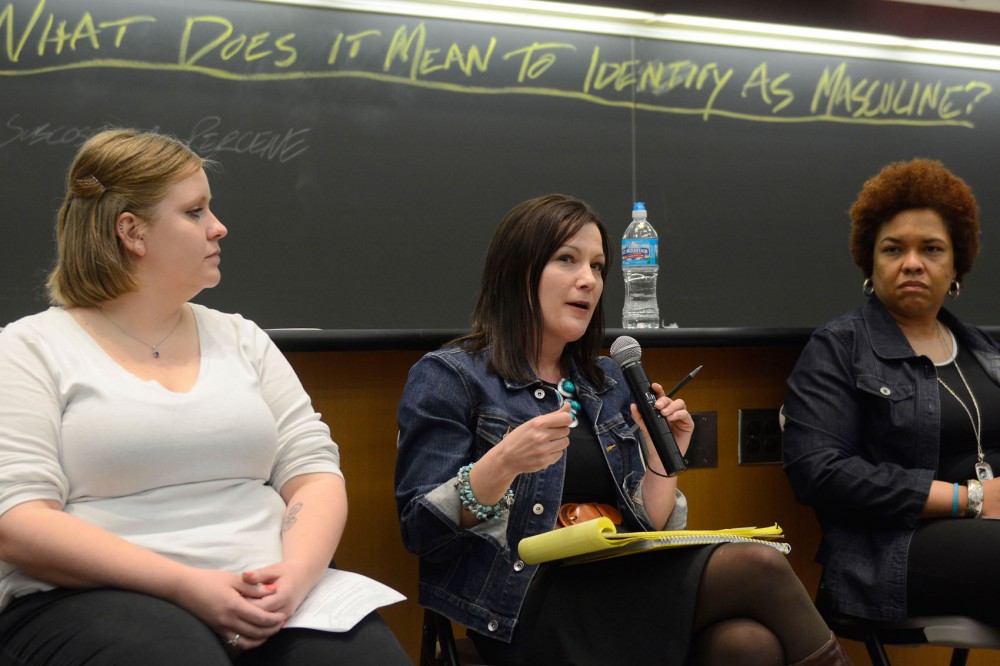Hundreds of students packed a Tate Lab of Physics auditorium Tuesday evening to talk about what it means to be a man and how some of society’s more destructive definitions can lead to problems like sexual assault.
A partnership between campus greek organizations, student government and the Aurora Center brought a group of experts together to discuss how the mantra “be a man” and harmful media messages can impact young men’s perceptions of masculinity.
“Boys are not raised to be men — boys are raised to not be a girl,” said Lindsay Gullingsrud, a panelist and coordinator for the Minnesota Coalition Against Sexual Assault, adding that men are pressured to not be in touch with their emotions and hide vulnerabilities.
Organizers hope the event will help greeks and the larger campus community take a step toward stopping sexual assault and other harmful behavior.
The event built upon past campus sexual assault and masculinity conversations and extended its scope to include a broader range of students, said Sigma Phi Epsilon Vice President Keaon Dousti.
He said he hopes to create a safe environment for discussing the issue outside of small groups.
“Sexual assault is still such a taboo issue,” he said. “There’s such a stigma around it, and people are so afraid they just automatically put their guards up.”
As the organizer of the panel, Dousti said he hopes the conversations encourage people to spread messages that prevent negative behavior and lead to a grassroots campaign for putting pressure on the conditions that lead to sexual assault.
The Minnesota Student Association has worked to connect greek chapters with similar events and hold frequent conversations about topics like consent and gender culture, said Jesse Mara, chair of MSA’s Sexual Assault Training Taskforce.
Having people educated on the topic in each chapter house can help when tragedies do strike, she said.
“There’s prevention and then there’s how we make something horrible less horrible through community.” Mara said. “When it comes down to it, everybody in the community needs to be on board together, taking the first step and making it our issue.”
Starting and holding consistent conversations between experts and greek chapter representatives can spread more discussion of these issues, she said.
Interfraternity Council President JD Braun said that involves talking about how negative traits take root in a community and what they look like.
“Toxic masculinity to me means perpetuating the stereotypes of men and not allowing men to be vulnerable and have deep conversations with each other,” he said.
“There’s that social norm that you need to be strong … you need to be that manly man.”
He said he hopes the local greek community’s partnership with outside groups on the issue will set a precedent for other campuses.
Tim Garay, a violence prevention coordinator with the Aurora Center who was a panelist at Tuesday’s event, said it can be difficult to stand up to friends who participate in destructive behavior like devaluing women verbally, but it’s important to let them know what they’re doing is wrong.
“You get a lot of people who are the vocal minority,” he said. “They think everyone in the room agrees with them.”
In high school, Dousti said he felt pressured to mask his feelings when he felt weak, uncomfortable or sad.
“When I played varsity soccer, it was always, you know, ‘Be a man.’ When you’re hurt, ‘Man up, don’t be a wimp, don’t play like a girl.’” he said.
College should give students an environment to break out of those stereotypical molds, he said.
Dousti said it’s critical to continue working on the issue.
“We can put out all these events, we can give all these speeches, we can give all these panelist talks … but if there’s no follow-up, if there’s nothing that comes after it, it all goes to waste,” he said.


